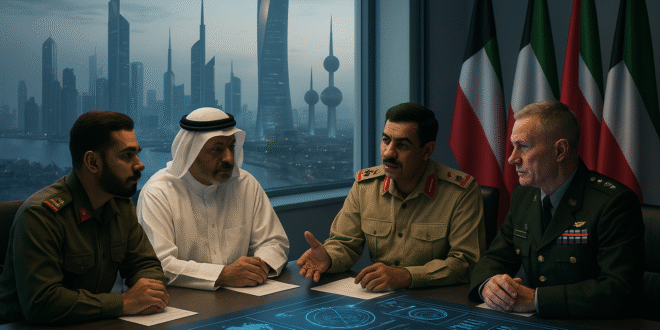Table of Contents
Introduction
The recent GCC military operations meeting held in Kuwait has drawn significant attention amid evolving regional security dynamics. Bringing together the top generals from all six Gulf Cooperation Council countries—UAE, Saudi Arabia, Kuwait, Qatar, Oman, and Bahrain—the meeting addressed pressing defense strategies and operational coordination. This article unpacks the main outcomes and explores how this high-level GCC military operations meeting impacts Gulf stability and defense collaboration moving forward.
Context & Background: Rising Importance of GCC Military Coordination
As geopolitical challenges intensify in the Middle East, the GCC nations increasingly recognize the necessity of joint military planning. The GCC military operations meeting in Kuwait underscores broader efforts to consolidate defense mechanisms against emerging threats, including regional conflicts, terrorism, cybersecurity risks, and external pressures.
This meeting involved not only defense chiefs but also strategic planners aiming to enhance interoperability among GCC forces. Importantly, it affected every member state by strengthening ties and readiness within a complex security environment shaped by shifting alliances and global uncertainty.
Main Updates / Core Insights from the GCC Military Operations Meeting
1. Enhanced Joint Military Exercises and Training
One of the meeting’s pivotal announcements was the expansion of joint military exercises across the GCC. These drills will focus on rapid response scenarios, maritime security, and counterterrorism efforts. Officials emphasized the need for “realistic, combined training” to improve coordination and operational readiness.
2. Cybersecurity and Defense Intelligence Sharing Boosted
Acknowledging rising cyber threats, the GCC agreed to upgrade collaborative cybersecurity frameworks. The military operations meeting highlighted plans for a secure intelligence-sharing platform to streamline threat detection and response, which will protect critical infrastructure throughout the Gulf.
3. Unified Command Framework Development
The GCC military operations meeting meeting unveiled progress on creating a more integrated GCC unified command system. This structure aims to ensure faster decision-making during crises and optimize resource allocation, reducing duplication while maximizing collective defense capabilities.
4. Regional Maritime Security Emphasis
With territorial waters and shipping routes increasingly vulnerable, the meeting prioritized maritime surveillance enhancements. Naval cooperation will receive renewed focus, safeguarding economic lifelines and ensuring freedom of navigation in strategic Gulf waterways.
5. Addressing Emerging Threats and Non-Conventional Warfare
Finally, participants acknowledged evolving threats such as drone warfare, asymmetric tactics, and hybrid combat scenarios. The gathering discussed adapting doctrine and procurement to effectively counter these new challenges confronting the GCC.
A senior GCC military official noted, “Our collective security depends on continuous cooperation—this meeting marks a vital step toward a unified, modern defense posture.”
Regional Impact: Boosting Security for UAE, Saudi Arabia, Kuwait, and Beyond
The outcomes of the GCC military operations meeting have immediate and long-term implications for member states. For the UAE and Saudi Arabia, expanded joint drills and cyber frameworks support their ambitions as regional security leaders. Kuwait’s hosting role further cements its diplomatic and strategic stature within the GCC.
Qatar, Oman, and Bahrain stand to benefit from unified command efficiencies and improved maritime defense, enhancing their ability to contribute meaningfully within Gulf security architecture.
This strengthened cooperation also signals to external powers, reinforcing GCC solidarity amid ongoing Middle East volatility. Related insights on regional defense initiatives and military cooperation can be found on The Credible Story’s [Gulf Security Trends 2025] and [Middle East Defense Strategies] articles.
Conclusion: A New Chapter in GCC Military Cooperation
The GCC military operations meeting in Kuwait has revealed crucial steps toward deeper defense integration, operational modernization, and mutual trust among Gulf nations. As geopolitical challenges evolve, sustaining momentum from this meeting will be key to maintaining regional stability and deterring potential threats.
Looking ahead, stakeholders and observers should watch for how these strategic plans translate into tangible capabilities and joint actions, further shaping the Gulf’s security landscape in 2025 and beyond.
External Authoritative Sources
Internal Links (The Credible Story)
Featured Image Prompt:
“Futuristic Gulf skyline overlay with military meeting scene in Kuwaiti conference room, Arabic and Western military officials in traditional and uniform attire, digital defense strategy maps glowing, modern corporate and urgent mood, Gulf flags visible — 1200×800 for news article banner”
 The Credible Story Trending stories that keep you hooked
The Credible Story Trending stories that keep you hooked




